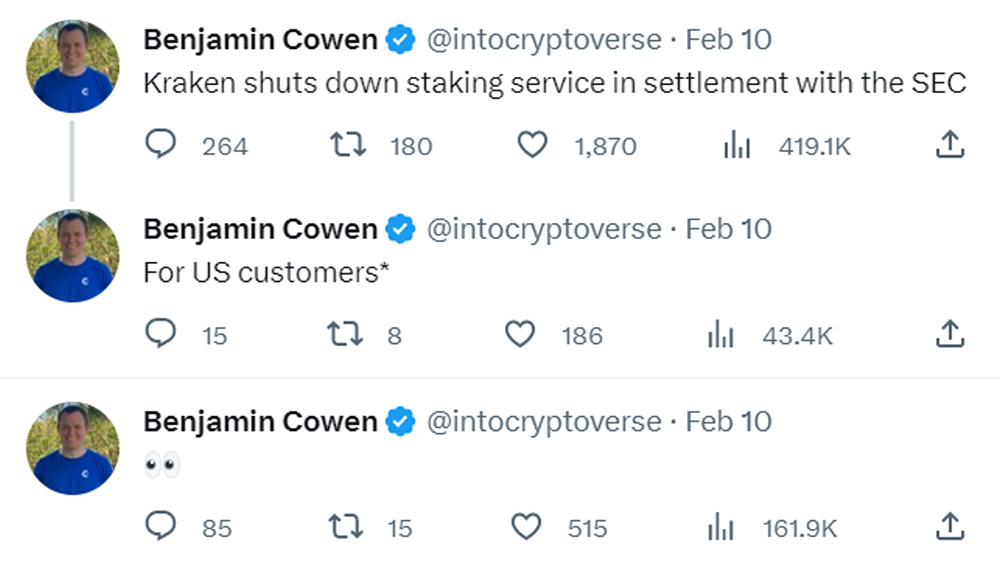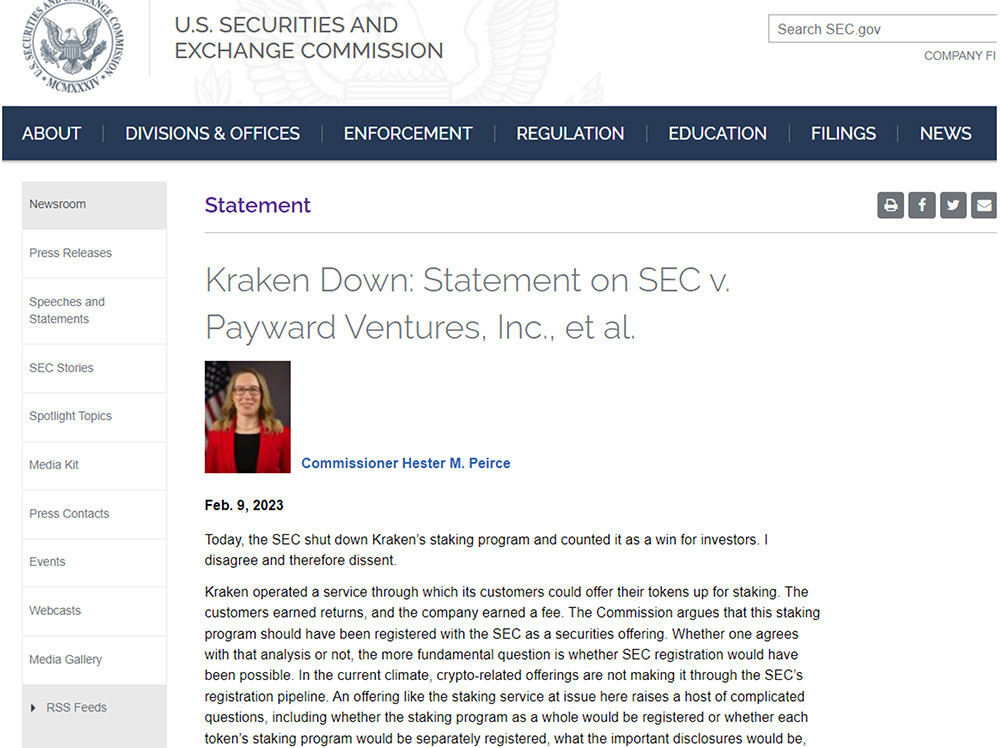SEC to Ban Crypto Staking? Here’s How Vulcan Auto-Staking Solves the Problem
The crypto community has erupted in shock over the news that the SEC will be cracking down on crypto staking in the U.S. The news comes amidst an ongoing crypto winter with hype compared to 2021 and 2022 dying down, and the market showing little signs of recovery.
While the story is still unfolding, it comes as a reminder of the drawbacks and limitations of centralized platforms in relation to government scrutiny. It also gives further weight to alternative DeFi methods such as Auto-Staking that solve this problem.
Here, we break down what has happened so far, why the U.S. is pushing to ban crypto staking, and why alternative DeFi methods such as Vulcan Auto-Staking can present a viable path forward.
Here’s everything that has happened so far:
- On Feb 9, 2023, Coinbase CEO Brian Armstrong tweeted about rumors that the U.S. Securities and Exchange Commission (SEC) is in preparation to ban crypto staking in the country.
1/ We’re hearing rumors that the SEC would like to get rid of crypto staking in the U.S. for retail customers. I hope that’s not the case as I believe it would be a terrible path for the U.S. if that was allowed to happen.
— Brian Armstrong (@brian_armstrong) February 8, 2023
The Twitter thread followed with concerns about how this would drive down innovation in the crypto space.
- A day later, news broke that the U.S. cryptocurrency exchange Kraken has shut down crypto staking in a $30 million settlement with the SEC.

Today @SECGov charged Kraken for the unregistered offer & sale of securities thru its staking-as-a-service program.
Whether it’s through staking-as-a-service, lending, or other means, crypto intermediaries must provide the proper disclosures & safeguards required by our laws.
— Gary Gensler (@GaryGensler) February 9, 2023
According to the SEC, the reason for the ban is Kraken offering staking as an unregistered security.
- Kraken Co-founder and CEO Jesse Powell pushed back on the SEC’s actions.
Oh man, all I had to do was fill out a form on a website and tell people that staking rewards come from staking? Wish I’d seen this video before paying a $30m fine and agreeing to permanently shut down the service in the US. How dumb do I look. Gosh. ⛽️💡https://t.co/UPdQdnI6xN
— Jesse Powell (@jespow) February 10, 2023
- Surprisingly, SEC commissioner Hester Peirce came out in support of Kraken and criticized her agency in a press release published on the SEC’s official website.

Crypto Staking in a nutshell
Crypto staking is a way to run decentralized blockchain platforms by offering investors a reward in return for helping them run operations. Here’s how it works:
- The platform issues a token.
- The investors use fiat money to buy the token and hold it for an agreed period of time.
- The platform uses that money to grow the platform and pay the investors an agreed-upon reward.
To start with, the context of the ban revolves around recent events in the cryptocurrency space such as Terra Luna and FTX shutting down. The events led to investors either losing money or being locked out of these platforms completely and unable to access their funds. More importantly, most of these were retail investors who lost a significant amount of money.
As per SEC, the current issue revolves around crypto platforms such as Kraken ignoring to comply and register with securities frameworks and ‘deciding their own rules’ when offering staking as a service to customers.
But as critics such as Hester Pierce, Brian Armstrong, Jesse Powell, and other notable figures pointed out, the SEC did not present any opportunity or clarity regarding what framework they had to comply with. The critics followed that shutting down a business’s service over a registration issue is unjust and lacks signs of any public process followed.
The need for control
The fight, as it stands, is over a technical legal issue. But, truthfully, this is just a surface-level explanation of the underlying issue: oversight of the cryptocurrency space.
Recent events such as the FTX debacle, cryptocurrency platform Celsius going bankrupt, Terra Luna crashing, and others have given the U.S. government a reason to push for regulation.
Kraken, an exchange that itself has a clean track record, is being punished for the mistakes of others in the community. More importantly, the lack of legal action taken against an outright fraud such as FTX when compared with Kraken shows that the government’s actual motive is to bring the cryptocurrency space under its control.
The reality of Centralized Exchanges (CEX) such as Kraken and Coinbase along with related centralized platforms is that they do not reflect the spirit of DeFi. They lack the transparency that DeFi promises and possess the authority to take your funds stored through staking. More importantly, they will always be subject to this kind of government scrutiny.
A pure DeFi method such as Auto-Staking solves this issue. The process is transparent, and transactions are openly reflected on a blockchain. The user remains in entire control of his funds without any need of committing to a lock-in period and without any need to rely on a 3rd party custodian.
It works by giving users the convenience to hold and earn yield without staking their funds on a platform, sending to a contract, or any action at all apart from literally just holding their own funds in their own wallet which they themselves control.
The process can work hand-in-hand with a unique process known as Auto-Rebasing’. The process automatically adjusts the circulating supply to keep the price stable. This solves volatility issues and algorithmically adjusts itself to preserve underlying value.
For the cryptocurrency space to mature, a DeFi protocol that offers Auto-Staking and Auto-Rebasing is the need of the hour. It solves the issues of government scrutiny and represents a stable method of preserving value amidst unstable market conditions.
Currently, Vulcan is the only blockchain within the space offering Auto-Staking, Auto-Compounding and Auto-Rebasing together as a solution. Some key features that make it unique over regular staking include:
- Vulcan’s circulating supply adjusts every 15 minutes through an Auto-Rebasing mechanism to protect against unstable market conditions and preserve the underlying value.
With regular staking, the lack of capability to adjust supply quickly opens the door to unstable market conditions that can destroy value. - The unique Layer-1 Auto-Rebasing and Auto-Staking features give Vulcan Blockchain the ability to offer 44% APR with minimized risk of market volatility affecting the returns.
- Because Vulcan Blockchain is not a centralized platform like Kraken or Coinbase, control remains with the user. The platform does not have the authority to take user funds such as with centralized platforms.
- The DeFi nature of the protocol protects it from similar government scrutiny.
The solution to current events is not centralized platforms such as Kraken that have the authority to take user funds through centralized staking and are subject to extreme government scrutiny. However, the solution is for the markets to adjust themselves and develop decentralized processes that tackle fraudulent activity and misuse of user funds. The spirit of DeFi through methods such as Auto-Staking will solve this problem.
This is why platforms such as Vulcan Blockchain present security and viability in comparison to regular methods of staking. More importantly, such DeFi platforms are more reliable in carrying the mantle of decentralization forward.